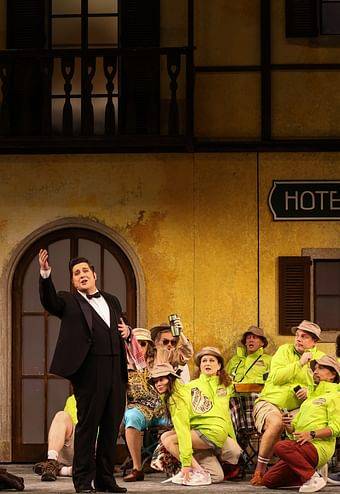There is none of the mythical world of earlier settings in Offenbach's work. In his Orpheus in the Underworld, first performed in 1858 in the Parisian theatre of the "Bouffes-Parisiens", we experience Orpheus as a bored music teacher and Eurydice as his wife who is annoyed by him. When Eurydice goes to hell, nothing could please her husband more! But public opinion compels Orpheus to reclaim his wife from Jupiter, the father of the gods. Bored with nectar and ambrosia, the whole family of gods joins Orpheus on his way to the underworld. In Offenbach's work, which is considered the first operetta in history, one can laugh about dreary marriages as well as about screwed-up gods and a party-addicted underworld.
This comedic masterpiece is directed by Spymonkey, UK's leading company for physical comedy. Orpheus in the Underworld marks the group's first production at an opera house. "Orpheus in the Underworld is a perfect fit for our comedic signature," says Toby Park, one of the artistic directors. "As a parody of antiquity and a travesty of myth, the play presents a world that everyone knows and intelligently turns it on its head. That's exactly how our performative language and form of comedy work too!" The Volksoper ensemble unleashes its true clown potential in this production.
Prologue
Jacques Offenbach is back in town! The founder of operetta has undertaken a journey through time to the present day and has returned to Vienna to see a performance of his greatest hit, Orpheus in the Underworld…
Act I
Scene One. The Death of Eurydice
In the countryside near Thebes. The marriage between musician Orpheus and his thoroughly bored, capricious wife Eurydice has broken down after years of mutual weariness. They have both been counteracting their boredom with separate amorous escapades for a good while. Eurydice’s current affair with the shepherd Aristaeus (who is in fact none other than the god of the Underworld, Pluto, in disguise) is so passionate that she immediately wants to get a divorce. But Orpheus isn’t even going to consider it and takes revenge on her with a tried-and-tested torture method: playing his own compositions! And on top of that, he has placed a poisonous snake in the adulterous love nest of his rival. Eurydice tries to warn her lover about this ruse but ends up getting fatally bitten. Together with Pluto, she journeys down to the Underworld. When Orpheus finds out about his wife’s death, he can’t believe his luck! But Orpheus hadn’t reckoned with Public Opinion personified showing up. She urges him to go to Jupiter, the father of the gods on Olympus, to demand his wife back.
Scene Two. Olympus
Morpheus strews sleep into the eyes of the gods returning to Olympus after their earthly forays, and they readily join the rest of their slumbering relatives upon the clouds. The inconsolable Diana raises a clamour which wakes the entire divine household, and it soon becomes evident that nothing up here runs the way Jupiter would see fit. His jealous wife Juno has heard the rumour that someone has kidnapped the mortal beauty Eurydice. That can only have been her immoral husband! Mercury, the messenger of the gods, refutes her suspicion: Pluto is the kidnapper. Pluto is instantly summoned to a hearing, but he hits back with a deceptive move: his devilishly tempting dishes make the gods crave solid nourishment – they’re sick and tired of the same old nectar and ambrosia. A revolt gets underway! In a “Clash of the Titans”, each accuses the other of living an excessive lifestyle, prompting the goddesses to unmask Jupiter as a notorious womaniser. Public Opinion scales Olympus with Orpheus in tow, who reluctantly asks for his wife back. Jupiter assures him of Eurydice’s return, but it’s at this point that he also casts his eye upon the fabled beauty. Jupiter makes his own way to the Underworld – to check that the arrangement is being upheld, of course – and everyone wants to go along!
Act II
Even Jacques Offenbach isn’t safe from Cupid’s arrow: he is madly in love with his leading lady and is always hot on her heels. He has a go at adapting some of the ideas from Orpheus in the Underworld for the current century…
Scene Three. Jupiter’s Transformation
Instead of being bored back home in Thebes, Eurydice is now bored in a hellish boudoir. John Styx, the general dogsbody of the Underworld, turns up as a poor substitute for her yearned-for lover and imposes his life story upon her at no one’s bidding. Pluto drifts into the Underworld along with Jupiter at last. The Olympian father of the gods offers his rival the opportunity to clear his name in accordance with mythological attitudes towards morality – Pluto should prove his innocence before the court of the Underworld. Jupiter, however, is far more interested in Eurydice’s current whereabouts than he is in the outcome of the trial. Cupid hurries to his aid with his squadron of “love police” and arranges for the latest of Jupiter’s famous transformations… Finally united, Eurydice and Jupiter hatch a plan to escape the Underworld – and Pluto immediately desires a similarly promising transformation for himself.
Scene 4. The Underworld
Pluto allows a roaring Dionysian celebration in his realm to escalate. All the gods of Olympus are revelling, and Eurydice performs a much-admired number under the disguise of a bacchante. Whilst Jupiter and Pluto are still fighting over Eurydice as the object of their desires, Orpheus and Public Opinion show up at the party. Jupiter, in a divine change of heart, decides that Orpheus should lead his wife out of the Underworld after all, on one condition: just don’t turn around!
Cast
- Conductor
- Alexander Joel
- Stage direction
- Spymonkey
- Stage direction
- Aitor Basauri
- Stage direction
- Toby Park
- Stage and costume design
- Julian Crouch
- Choreography
- Gail Skrela
- Video
- Joshua Higgason
- Lighting design
- Tim van't Hof
- Choir director
- Roger Díaz-Cajamarca
- Dramaturgy
- Magdalena Hoisbauer
- Orpheus
- Karl-Michael Ebner
- Eurydike
- Hedwig Ritter
- Öffentliche Meinung
- Katia Ledoux
- Pluto (Aristeus)
- Robert Bartneck
- Jupiter
- Marco Di Sapia
- Juno
- Ursula Pfitzner
- Merkur / Aikos, ein Richter
- Jakob Semotan
- Diana
- Jaye Simmons
- Mars
- Aaron Pendleton
- Venus
- Maggie Reneé
- Cupido
- Juliette Khalil
- Minerva
- Gail Skrela
- Hebe
- Caroline Richards
- John Styx
- Sebastian Matt
- Jacques Offenbach / Morpheus
- Marcel Mohab
- Wolfgang Zimmer, sein Adlatus
- Georg Wacks
- Minos, ein Richter
- Oliver Liebl
- Rhadamanthys, ein Richter
- Kevin Perry
- Jakob Semotan
- Ensemble
- Madeleine Rowe
- Ensemble
- Caroline Richards
- Ensemble
- Michal Chovanec
- Ensemble
- Ondřej Klíč
- Ensemble
- Gail Skrela
- Musik
- Jacques Offenbach
Photos and Videos
For all those who use a screen reader, a description of the visual aspects of the performance (set design, costumes...) follows here instead of the photo gallery.
The operetta takes place in an opulent, exuberant setting. Painted set elements, reminiscent of baroque theater, show the earth, Olympus and the underworld. The costumes are colorful and imaginative, individual for each character, the gods in classic operetta costumes, dancers in sheep costumes, children's compars as bees, Jupiter dressed as a bow tie, can-can dancers in flowing skirts and much more. Stage and costumes play ironically with old theatrical elements.

.jpg)
_1.jpg)
.jpg)
.jpg)
.jpg)
.jpg)
.jpg)
.jpg)
.jpg)
.jpg)
.jpg)
.jpg)
.jpg)
.jpg)
.jpg)
.jpg)
.jpg)
.jpg)
.jpg)
.jpg)
.jpg)
.jpg)
.jpg)
.jpg)
.jpg)
.jpg)


